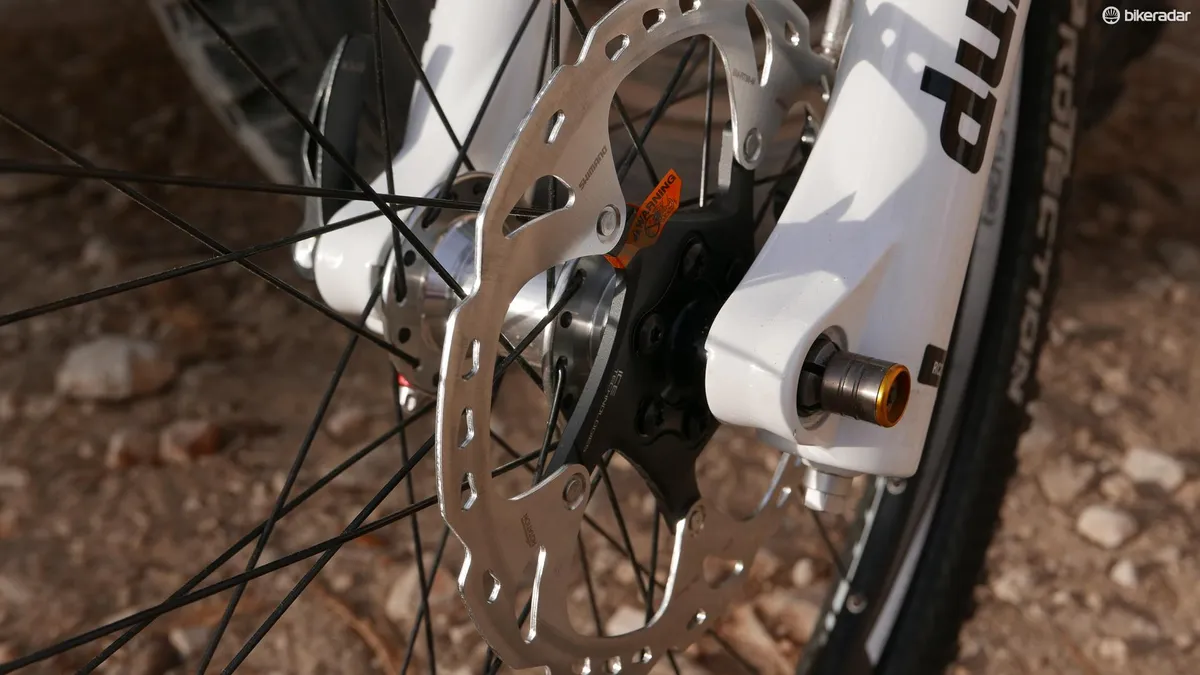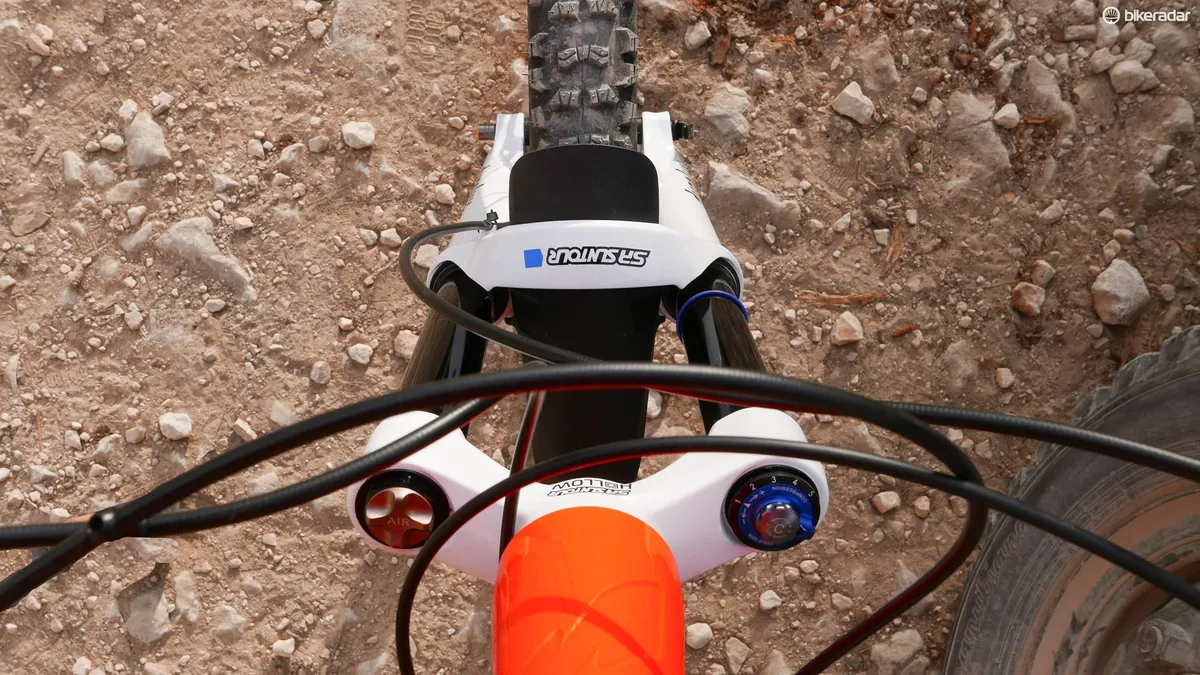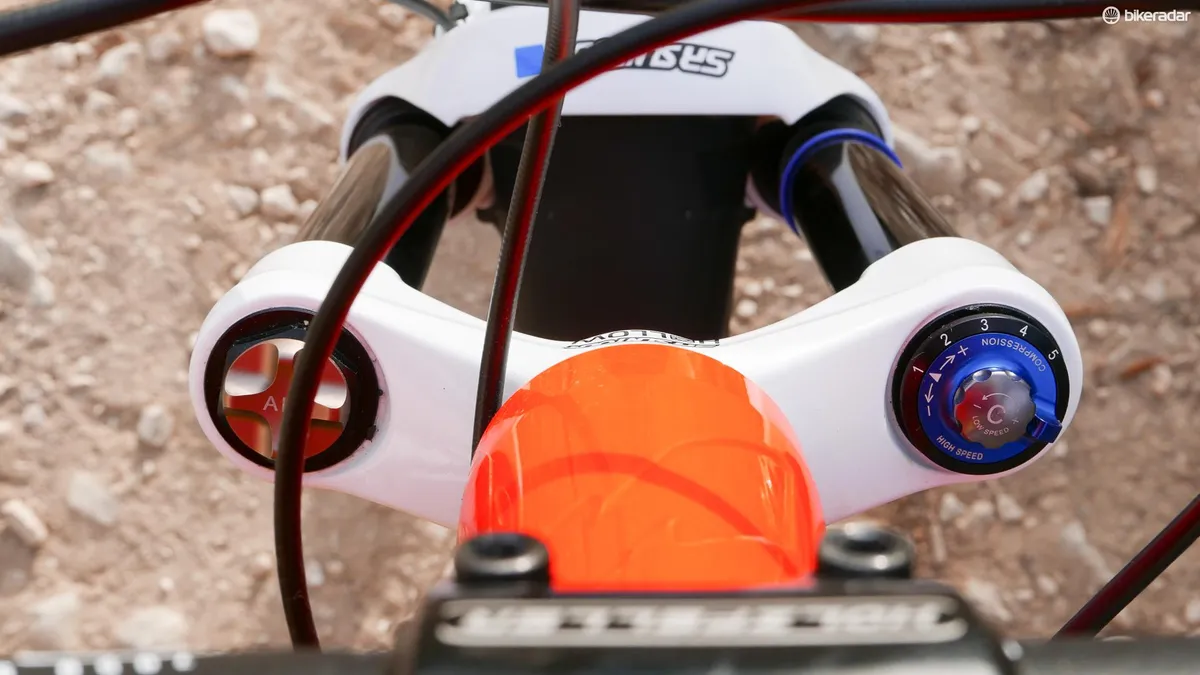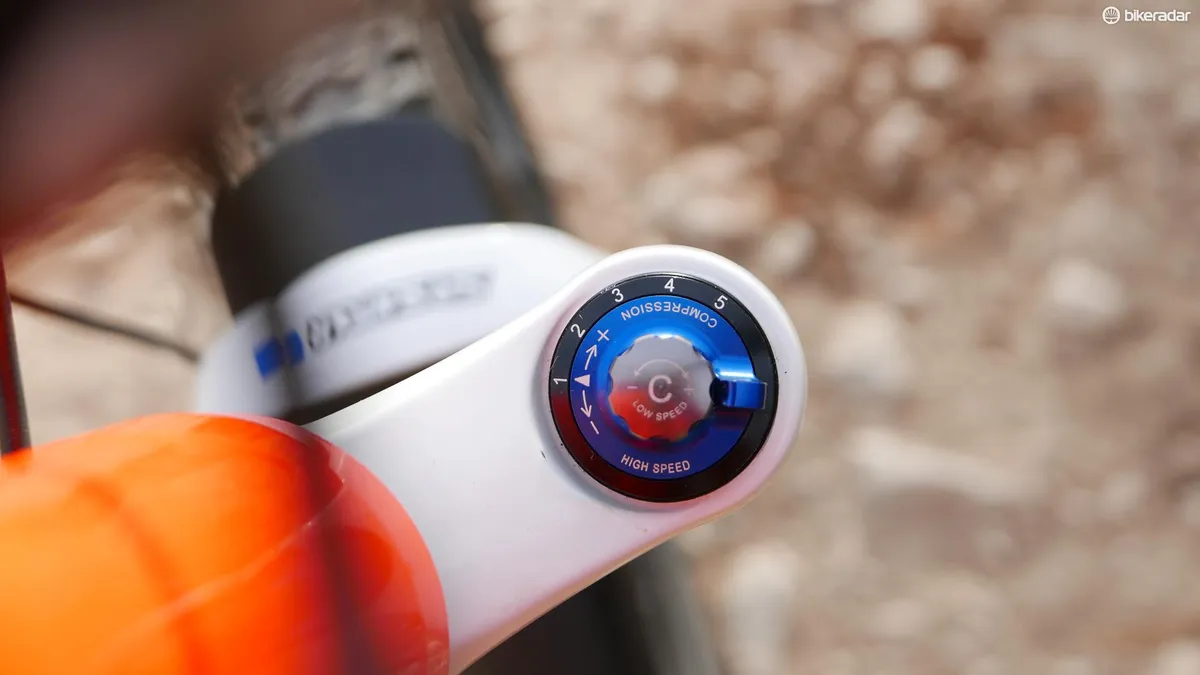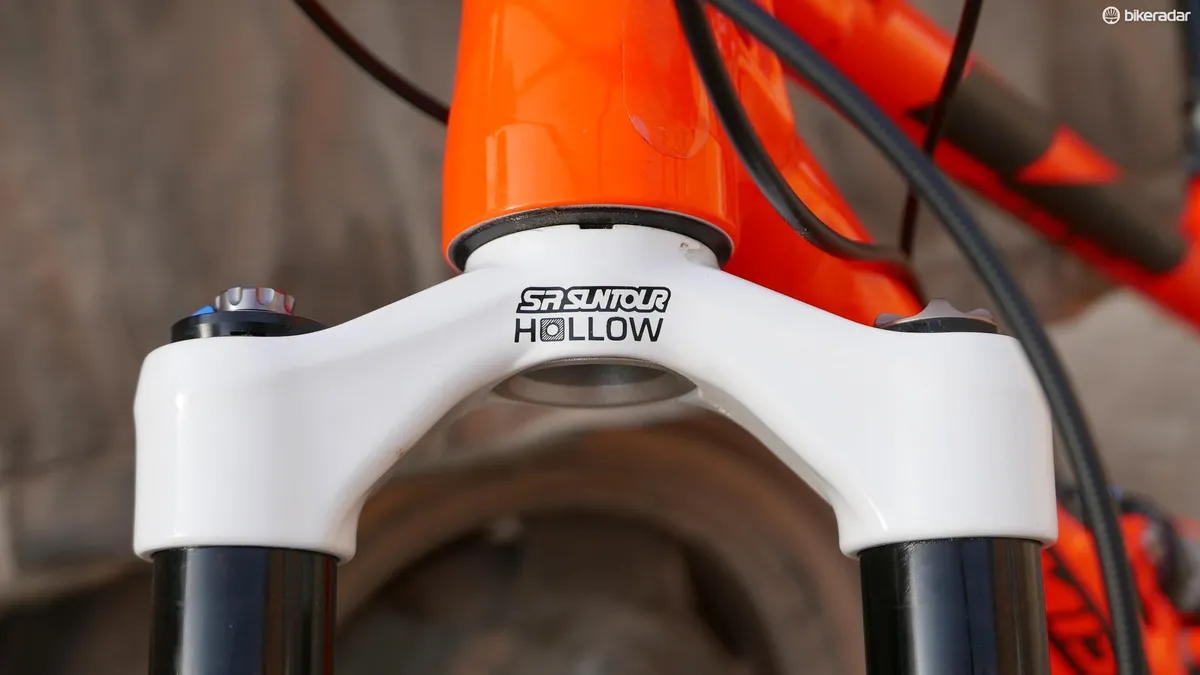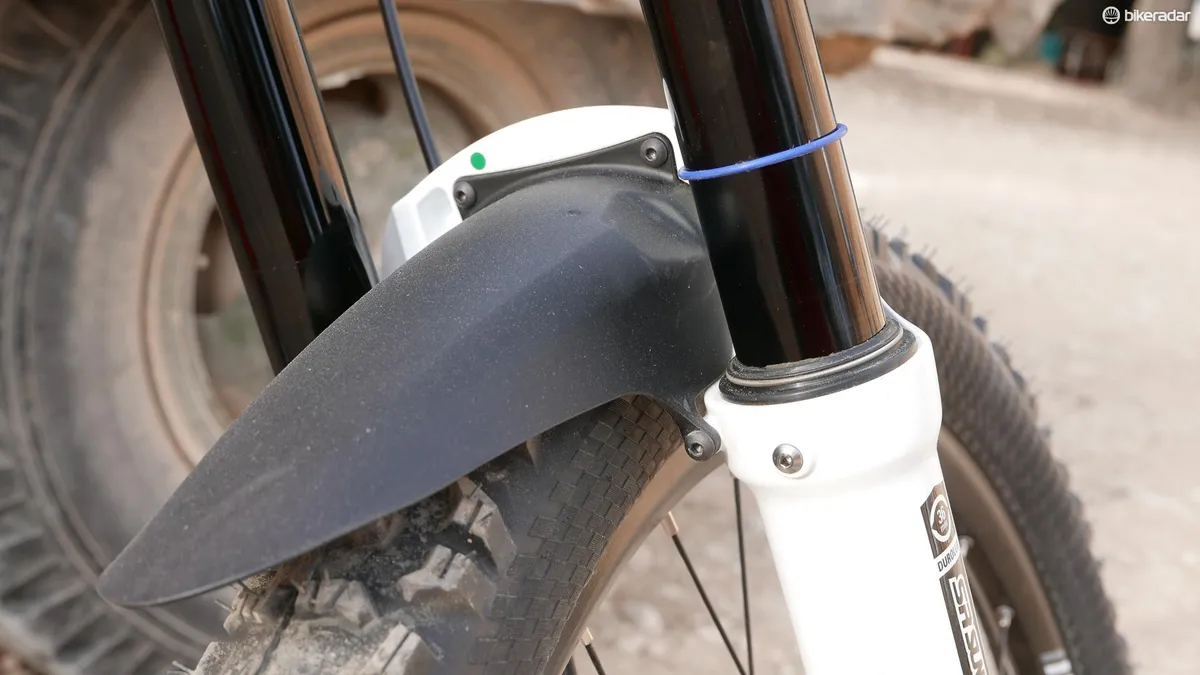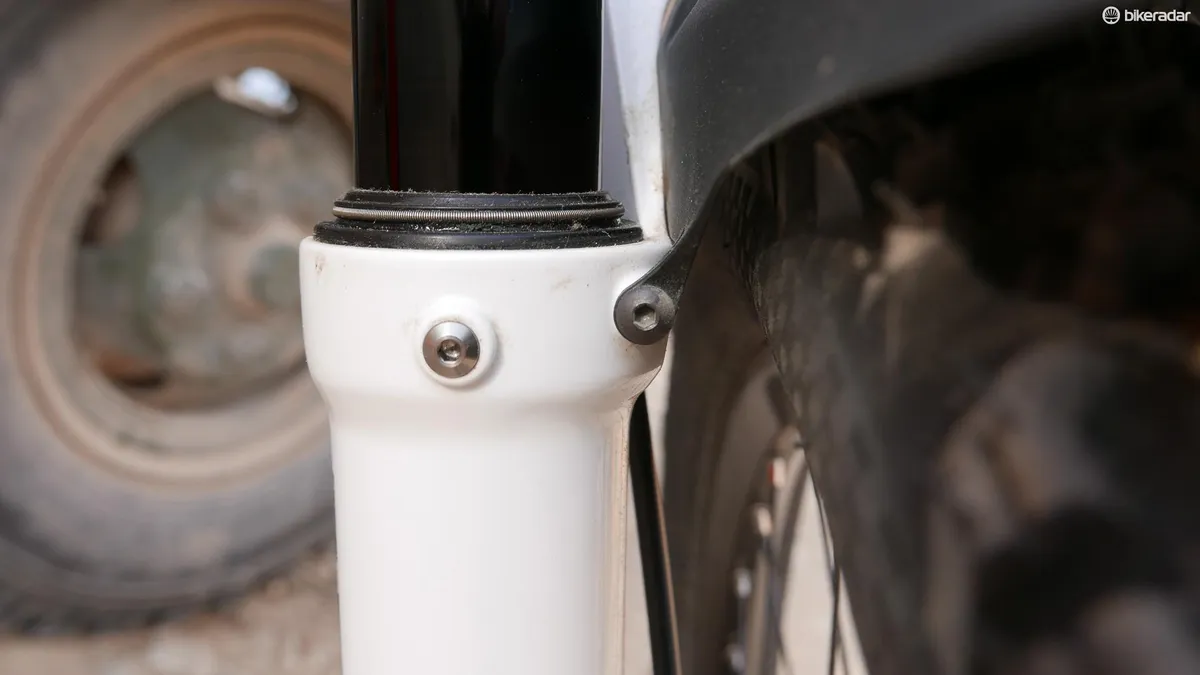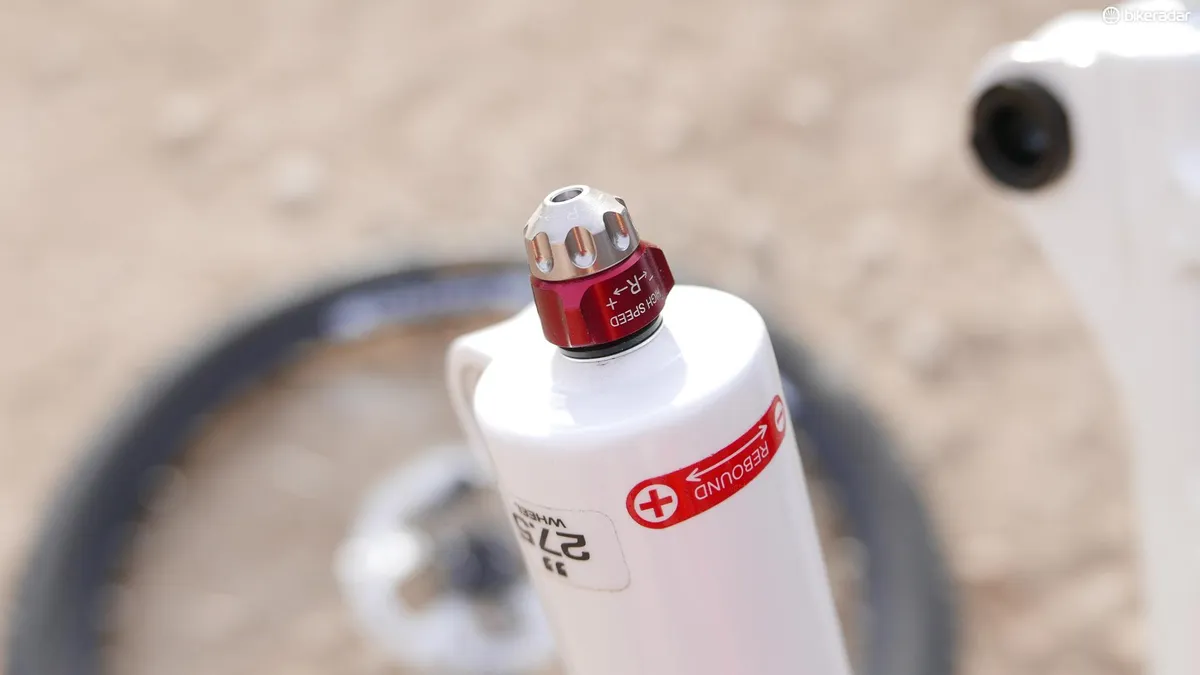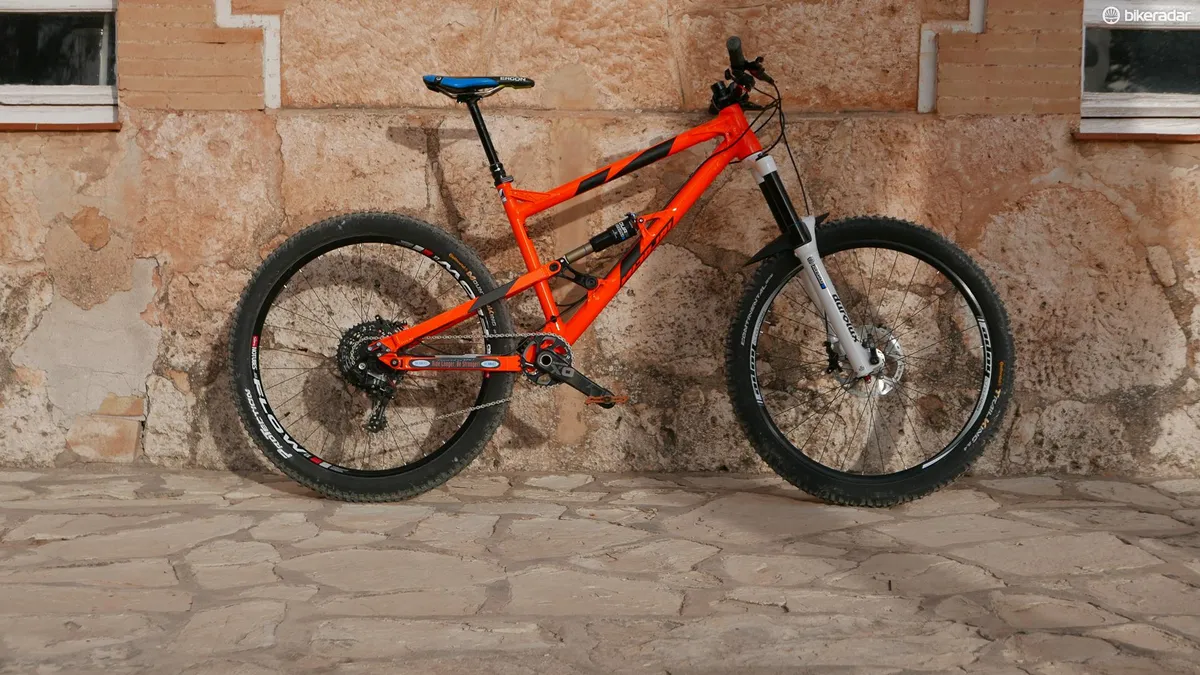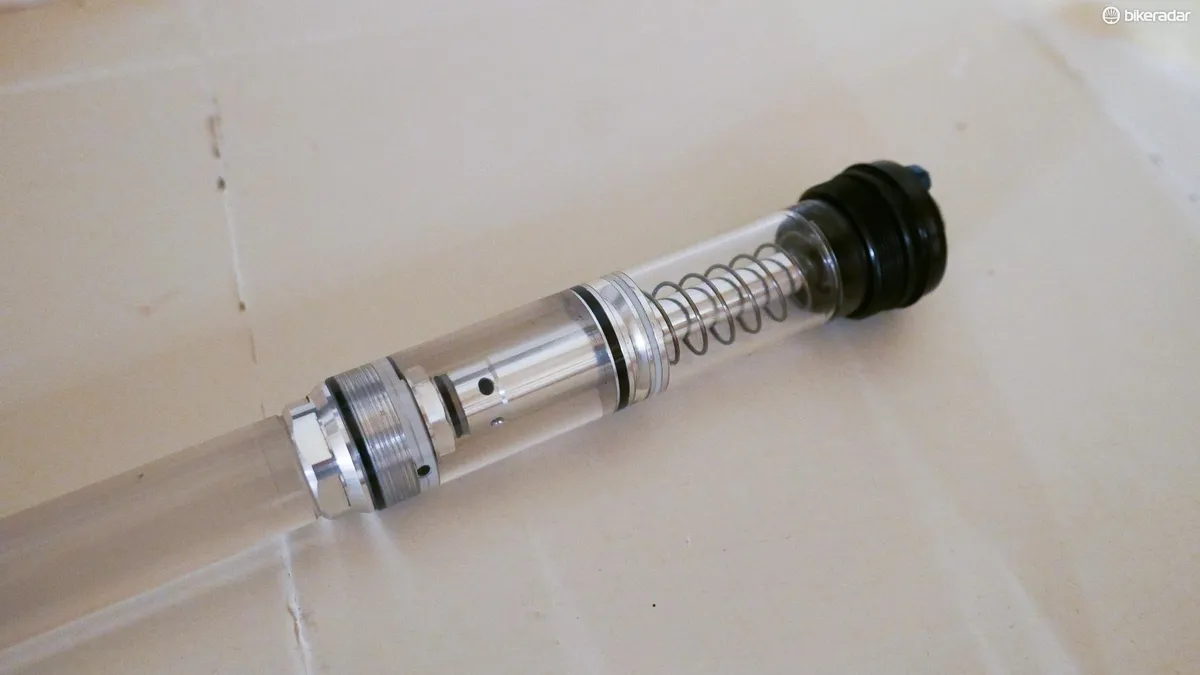As the arms race of mountain bike technology has progressed, it’s unsurprising that prices have risen rapidly too. With its new R2C2 damper and a beefier chassis, SR Suntour has breathed new life into the 160-180mm Durolux fork, with features seen on big name forks but without a huge price tag.
The stanchion diameter has been boosted up by 1mm to 36mm for this 650b-only model to increase stiffness. Meanwhile the magnesium lowers have a number of neat features, not least an integrated mudguard and quick-service ports for adding lube to the foam rings below the seals using a RockShox Reverb-style bleed syringe.
Adapters allow you to convert the fork for 15 or 20mm axles and the quick release thru-axle is easy and fast to use once you’ve got the knack. You can also adjust the travel of the fork internally from 160 to 180mm in 10mm increments using clip-on spacers. A really neat touch is that the travel adjustment spacers also double up as the air volume adjust spacers, allowing you to tune how progressive the fork is. As well as the fixed travel model, a travel adjustable 180-140mm unit is available.
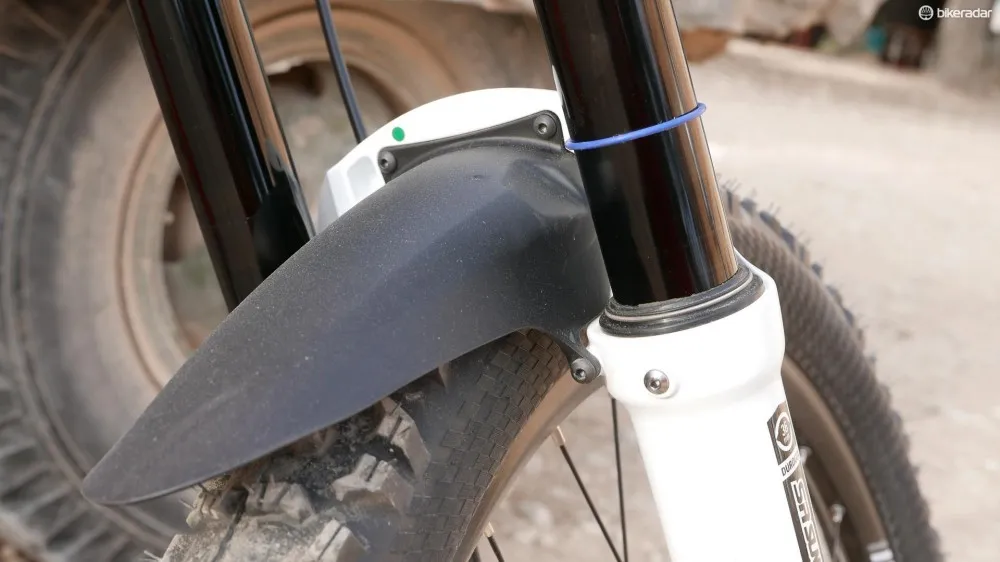
Adjustable for action
The big news is elsewhere however. While it will be available with the less adjustable RC2 or RC dampers, an all-new R2C2 damper promises high performance paired to easy user serviceability and long-term durability.
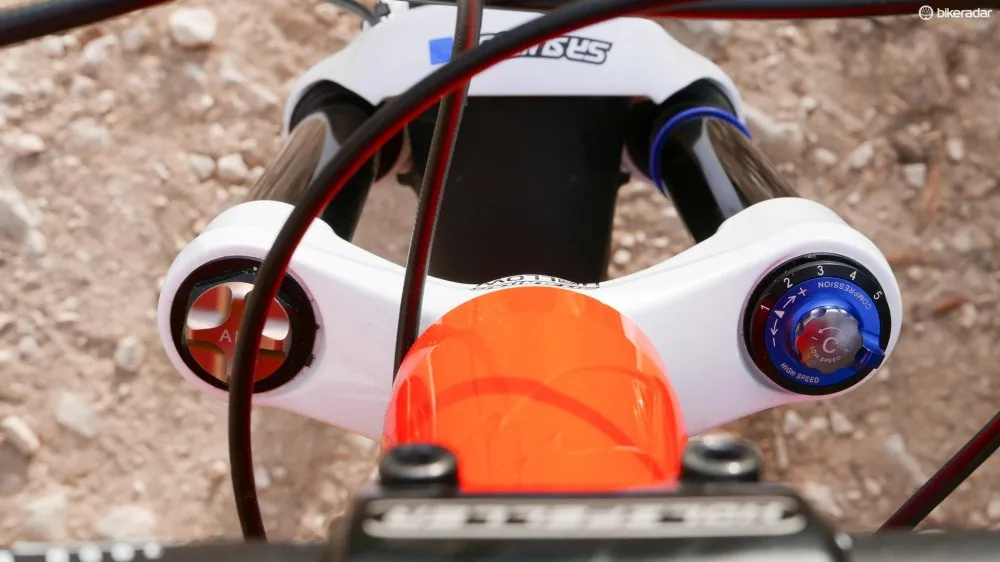
Plenty of damping control here
As the name suggests, the new cartridge gives you control of high and low speed compression damping as well as high and low speed rebound. That’s more adjustment potential than Fox’s high end RC2 damper, which does without the high speed rebound controls. High speed rebound controls the return rate of the spring from very deep in the travel, allowing you to tweak just how fast the fork can return from seriously big hits and regain its composure for whatever is coming next. The damping range on offer is designed to be useable however; you get five clicks of high speed rebound and 18 clicks of low speed.
Not getting bladdered
It’s not just the adjustment on offer that’s a bit different. While the damping cartridges on most high-end forks use a rubber bladder to compensate for the change in oil volume as the damper shaft moves through the travel while keeping air and oil separate, this design doesn’t.
Instead there’s a spring-loaded piston in the oil reservoir that moves as the damper cycles. It’s called the Piston Compensator System, or PCS. It’s well proven technology. Most rear shocks use this kind of ‘internal floating piston’ design but due to the high leverage ratios of rear suspension designs, they usually use extremely high pressure nitrogen charges to ensure oil and air don’t mix. As the internal oil pressure of forks is much lower, a relatively light coil spring is used instead.
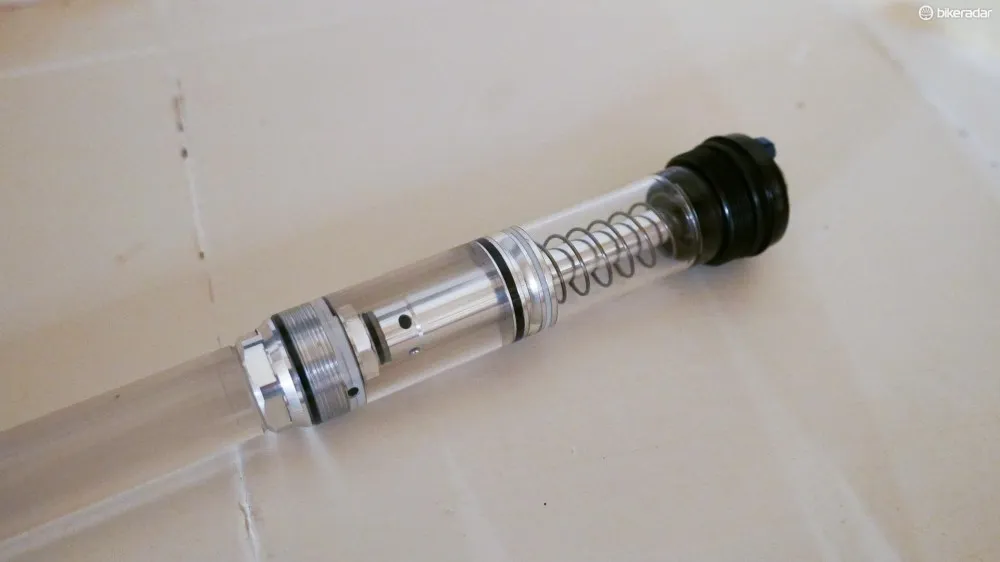
PCS is a similar system to that found in most rear shocks
The PCS system has a couple of benefits and drawbacks over a bladder-style damper. The main drawback is that the piston requires a rubber seal and that means there’s inevitably more internal friction than a bladder, though the low pressure coil spring and an anodised shaft help reduce this. SR Suntour has been willing to make this compromise because its engineers feel their system is significantly more durable than a bladder. During rig testing, their damper was cycled over 200,000 times without issue, while high end rivals using bladders were said to have suffered failure at around 150,000 cycles.
Simple to service
It also means that the system is user serviceable with no special tools, unlike bladder-based cartridges, which require careful bleeding to ensure no air mixes with the damping oil. This, along with the phenomenon of cavitation – where high pressure changes cause voids to appear in the oil and result in loss of damping control – is usually what necessitates a damper service.
With the R2C2 design, it’s possible to remove the damper top cap and a couple of screws and gently compress the damper to bleed any air out of the system, a bit like you might with your disc brakes. It’s all part of what Suntitsour calls their ‘Quick Service Philosophy’, which aims to reduce the maintenance needed and make it easy for moderately competent mechanics to complete it when it is.
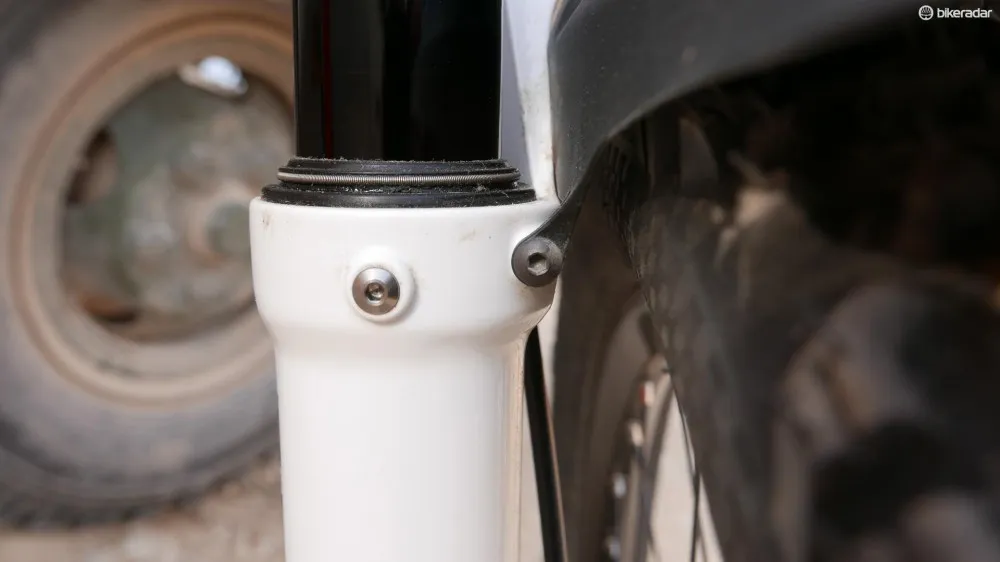
Easy access to lubricate the foam seals
That approach also follows with their air spring. A lot of fork air springs use a bleed port to allow air from the main ‘positive’ air spring to pressurise the ‘negative’ air chamber, which controls how supple the fork is in the initial stroke. SR Suntour feels this design is too complex to be really reliable, so uses a trio of coil springs in the negative chamber instead. While this design doesn’t automatically balance the two chambers, they reckon this is only a problem for very light riders, for whom they have softer negative coil springs available.
This, along with a policy of favouring durability in design, does have a weight penalty. SR Suntour claims a weight of 2250g for the non-travel adjust fork, which is a fair bit heavier than rivals such as the 1860g RockShox Pike RCT3 Solo Air or the Fox 36 RC2 at 1960g. Of course, despite the technology on offer, the forks have a huge advantage when it comes to price. The Durolux R2C2 will cost £549 / €649 / $800 / AU$TBC. That’s not small change by any measure, but is a lot cheaper than similarly featured rivals.
Ride impressions
The price tag may be smaller, but can the Durolux offer performance on a par with the big brands? SR Suntour was obviously confident in its product, chosing the notoriously rough and rocky La Fenasosa bike park in Spain as the location for its launch. Our first impressions are that the brand might just have achieved what it set out to.

The fork doesn’t have any noticeable stiction from the off, with a supple starting stroke yet plenty of support deeper into the travel. If the PCS design does have more internal friction, it wasn't noticeable on the trail, with very good small-bump sensitivity. There’s great quality in the construction, with positive-feeling adjustments on all the dials. With all the adjustment on offer, it takes a bit more time to get the fork set up perfectly, but even on unfamiliar trails it was possible to get it to work well in a range of situations without much tinkering.
The chassis is very stiff and precise too with great tracking through the rough and no hint of bend or bind.
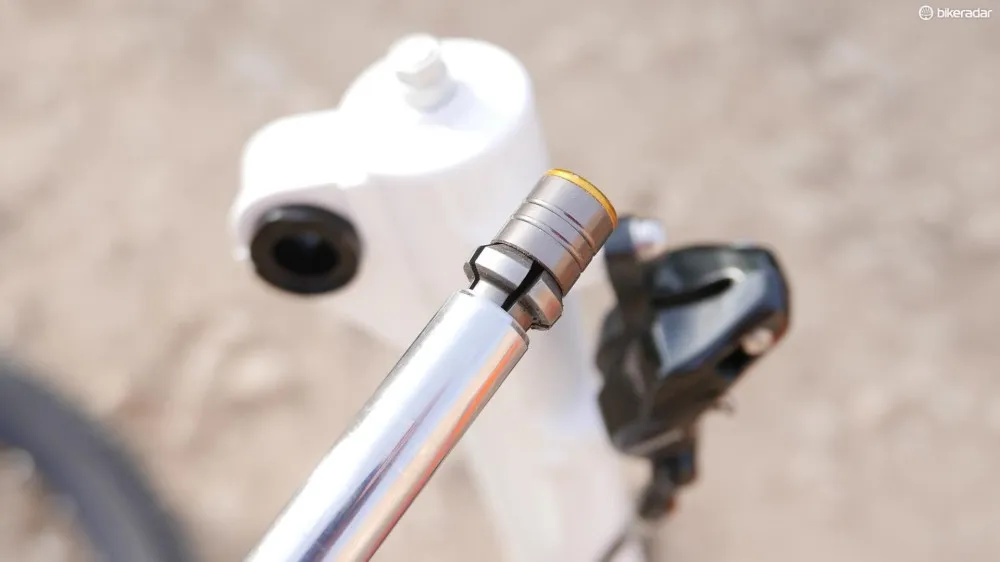
The thru-axle is easy to use once you know what to do
It's fair to say that riding unfamiliar, very rough trails isn't the best way to be able to determine just how it stacks up against the competition but we’ve got a fork for proper long term testing so we’ll report back with an in-depth review as soon as possible. As it stands, this could well be the fork that makes SR Suntour a real option for riders that value durability and ease of service over low weight, but aren't willing to compromise on performance.

